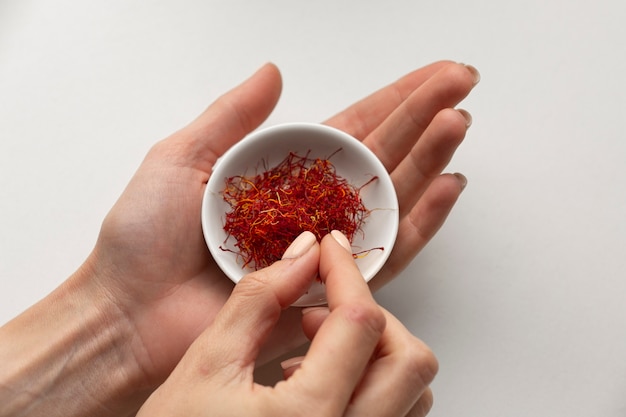
Saffron is a well-loved spice, commonly used in cooking to enhance flavor and add a beautiful natural color to dishes. Derived from the flowers of Crocus sativus, it’s packed with medicinal properties. Many believe that consuming saffron during pregnancy boosts the mother’s health and eases pregnancy-related discomforts.
Also known as Kesar, Zaffran, or Koung, saffron comes in thin, thread-like strands that dissolve easily in food. There’s a traditional belief that mixing saffron with milk or food during pregnancy might result in a fairer complexion for the baby. While this claim lacks scientific backing, saffron has plenty of other health benefits for expectant mothers, making it a popular addition to their diet. However, like any herb, saffron should be consumed in moderation, as taking too much can pose health risks.
### Saffron Uses
Saffron is a versatile herb with uses that go beyond cooking. Its antioxidant and anti-aging properties make it a common ingredient in skincare products, helping to reduce wrinkles and promote a radiant complexion. As a home remedy, saffron’s medicinal properties are valued for treating various issues, including pregnancy symptoms like morning sickness, digestive problems, and mood swings. It is often added to dishes like biryani, kheer, and sweets to enhance flavor and create a natural golden hue, eliminating the need for artificial food coloring.
Saffron is also thought to relieve pregnancy discomforts and possibly improve the complexion of the baby, though its real advantages during pregnancy come from its nutritional content and ability to manage common pregnancy issues.
### Benefits of Saffron During Pregnancy
1. **Eases Morning Sickness**
Morning sickness, marked by nausea and vomiting, is a common symptom during pregnancy due to hormonal changes. Saffron, when consumed as a tea or mixed into milk, can help alleviate dizziness and nausea, giving you a more energetic start to your day.
2. **Boosts Iron Levels**
During pregnancy, falling iron levels can lead to anemia, which puts both mother and baby at risk. Saffron, being rich in iron, can help maintain healthy hemoglobin levels when added to meals in moderation.
3. **Improves Digestion**
Digestive issues like constipation, bloating, and gas are frequent complaints during pregnancy due to the growing baby putting pressure on the stomach. Saffron promotes better blood flow in the digestive tract, aiding smoother digestion and easing such concerns.
4. **Prevents Hair Fall**
Pregnancy hormones can trigger hair loss. A natural remedy using saffron, milk, and licorice can help prevent bald spots and strengthen hair. Applying this mixture as a paste to the scalp a few times a week may encourage healthier hair growth.
5. **Relieves Mood Swings**
Hormonal fluctuations often cause mood swings, making you feel happy one moment and anxious or sad the next. Saffron has natural mood-boosting properties, helping to stabilize serotonin levels in the brain, which improves mental well-being.
6. **Boosts Appetite**
Digestive discomfort can sometimes reduce appetite, which is a concern since pregnant women require additional nutrients for their growing baby. Saffron stimulates the digestive system, helping restore appetite and making it easier to consume the necessary amount of food.
7. **Relieves Cramps and Pain**
Muscle aches and cramps are common as the body adjusts to accommodate the baby. Saffron’s soothing properties can help reduce pain in the stomach, lower back, and joints, making pregnancy more comfortable.
8. **Manages Blood Pressure**
Maintaining stable blood pressure is crucial during pregnancy. Saffron contains potassium and crocetin, which help to lower high blood pressure, reducing the risk of related complications.
9. **Supports Heart Health**
Pregnancy cravings can lead to overeating, which increases the load on the heart. Saffron’s combination of potassium, antioxidants, and crocetin helps counteract these effects, supporting a healthier heart and reducing the risk of cholesterol build-up.
10. **Treats Respiratory Issues**
Pregnancy can sometimes bring respiratory problems. Saffron’s anti-inflammatory properties reduce swelling in the lungs and clear nasal blockages, making breathing easier. It’s also thought to help with asthma symptoms.
11. **Improves Skin Health**
Hormonal changes may lead to skin problems like acne, dark spots, or melasma during pregnancy. Saffron purifies the blood, helping to prevent skin issues and promoting a healthy, radiant complexion.
12. **Promotes Better Sleep**
The challenges of pregnancy, from body aches to growing bellies, can make restful sleep difficult. Saffron’s mild sedative properties relax the body, improving sleep quality when consumed in moderation, especially in warm milk or tea.
### Side Effects of Saffron During Pregnancy
While saffron offers many benefits, consuming it in excess can lead to certain risks, including:
– **Vomiting:** Saffron may not be suitable for everyone. If it causes severe nausea or vomiting, stop its consumption immediately.
– **Hypersensitivity:** Some women may experience reactions like headaches, dry mouth, or anxiety. These symptoms suggest saffron might not agree with their system.
– **Dizziness:** The slight sedative quality of saffron can sometimes cause feelings of lightheadedness.
– **Allergic Reactions:** Those allergic to plants like Lolium or Sasola may develop similar reactions to saffron, such as rashes or swelling.
– **Numbness:** Tingling sensations in the hands, feet, or face can occur with overuse.
– **Toxicity:** Overconsumption may lead to severe issues like diarrhea, jaundice, or even hemorrhage.
– **Increased Risk of Miscarriage:** Excess saffron can raise body temperature, causing uterine contractions that might lead to miscarriage. It’s best to avoid saffron during the first trimester and always seek your doctor’s advice before including it in your diet.
### Conclusion
Saffron can enhance a pregnant woman’s well-being by addressing many common symptoms, from digestive issues to mood swings. However, it must be consumed in moderation to avoid potential risks. Always consult your gynecologist before adding saffron to your pregnancy routine to ensure it’s safe for you and your baby.